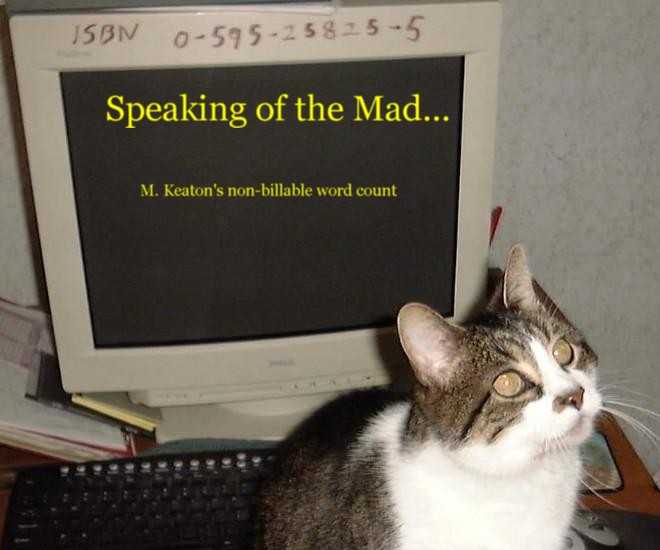I finally mewed at the Thin Man until he agreed to explain, at least in brief, his philosophy of the soul and why animals do go to heaven. Because it is pedantic and of little interest to the reader (in his opinion) he wants me to spread it out (I’m thinking of instituting ‘TheoTuesdays’ like the current ‘ConspiriThursday’) and he insists on the following disclaimer:
There are public theologies and private thoughts. Likewise, there are core, vital doctrines and then there are those speculations that are not truly relevant in the grand scheme of Salvation. This is a private speculation based largely on two foundations: the fact that it seems intuitively correct and does not contradict anything extant in the Holy Writ; and a reasoned extension of the already-displayed character and consistency of God documented in the Holy Writ. These are one man’s thoughts in the long hours of the night and should not be considered in any way worthwhile doctrine or even subjects of debate (except, perhaps, where the reader may find the Holy Ghost prompting within—and at that point it is an issue between God and the reader).
The materialist paradigm long ago infested religious thought. Nowhere is this more obvious than in the prevailing view of the soul. We take for granted a kind of ‘assembly line soul’ on a lease-to-own plan—one per customer, standard size, one size fits all, no alterations, return it when you’re done and pay for any damages. This is not a view based on nature, experience, or Holy Scripture; it is a view rooted in an industrial worldview.
We are never told the limits of the soul and I believe that is for a reason: there are no limits of the soul. There is no maximum or minimum amount of ‘soul’ and no limits of breadth or width or height. The soul is unquantifiable. It has quality but not quantity. If the soul could be summed up into a set of dimensions, definitions, and limits, if it could be bound up in a trap of words, then it would not be a soul. The soul must be more than mundane. It must exceed measurement for, if it did not, then it would not be worth the terrible cost that has been paid to redeem it. And because of this, there is no reason not to assume (and every experiential reason to accept) that the soul can be hurt, can be (at least temporarily) diminished and oppressed (though never extinguished, for it is sustained by an indefatigable spark of divine grace), and that the soul can, in turn, heal, grow, and expand without limits.
I have previously discussed that the soul can be taken, given, and distributed across vast distances of space and time. The logical question is: Why? Why allow something as precious as the soul to be spread outside the physical body into the entire sphere of influence of the individual? I contend it is exactly that: so that the influence of an individual’s soul can be spread across the entirety of that person’s reach. It would diminish the value and usefulness of the soul if it were to be tied only to the physical body. If I could not reach out and lend encouragement, comfort, ennoblement, and all the other virtues of the soul across time and space, then my usefulness to the overall plan of God would be pointlessly diminished. God is not wasteful or shortsighted and I would therefore argue that, if it is gainful, there is no reason to doubt at least the possibility of the extension and transference of the soul from and to other people.
There is a term for this in business: investiture. Modern Christianity has an even more incomplete term: discipleship. I prefer the simpler terms. I call it friendship and, beyond that, compassion. We give of ourselves to other people, close friends or strangers, of our time, caring, labor—in a word, we choose to love them. And some, in turn, do the same for us. This is an example of the sharing of the soul. We may be hurt because we make ourselves vulnerable. To a zero-sum believer, this is a terrifying prospect. Surely to give of your soul diminishes the grace you retain within; to love is to become less than you were before. To a transcendent believer, this ability to give is a cause for great joy. We do not run out—there is no empty tank of soul—and, though we may and will be hurt, we may also increase someone else. In turn, when we are weak and tired, others will do the same for us. It is a strange, confusing, frightening process that we can never fully understand but that, on a spiritual level, we are impelled instinctively to do; the whole of the human experience—ours, those around us, and total strangers possibly even generation removed (for remember, the soul is extemporal, it cares nothing for time)—is made better and made to see more of God’s grace channeled through us.
Now, if memory serves, I set out to explain how all of this was relevant to animals.
Tuesday, June 23, 2009
Subscribe to:
Comments (Atom)




















